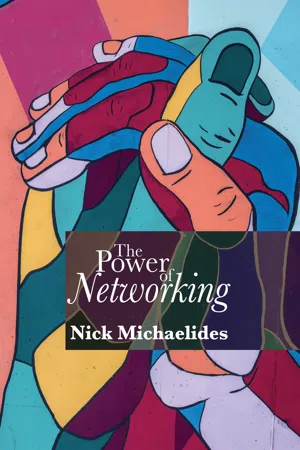
- English
- ePUB (mobile friendly)
- Available on iOS & Android
The Power of Networking
About This Book
Nick Michaelides is an entrepreneur and investment advisor with particular expertise in the EMEA region. He is the President and Founder of his consulting and property business and is, at present, expanding in the real estate sector in Cyprus and Dubai. He grew up in Toronto, Canada and is originally from Cyprus, where he is currently based.
From a young age, he has been particularly interested in the ways through which people interact, form relations, create and maintain successful networks. He has also been studying how the improvement of personal traits attract connections at the professional level.
In his second book, "The Power of Networking", Nick explores how networking can make or break deals, as well as the importance of social connections in setting a new standard for generating meaningful business connections.
Frequently asked questions
Information
PART 1 - TECHNIQUES IN HANDLING PEOPLE
CHAPTER 1 - DON’T CRITICIZE, CONDEMN OR COMPLAIN
We see it all around. The vast majority watch and point at things not progressed nicely yet never recognize things progressing admirably. Also, a large part of the time, we are occupied with discovering the flaws in others and never attempt to pass judgment on ourselves or our activities.
CHAPTER 2 - GIVE HONEST AND SINCERE APPRECIATION
The longing to be important is a thing that makes us human. The craving to leave something significant after death, the longing to be significant for someone, to add to our life is something huge, expansive. When did you last compliment somebody? When did you censure somebody and educate him concerning his missteps? I figure it is probably easier for most people to answer the second ques...
Table of contents
- PART 1 - TECHNIQUES IN HANDLING PEOPLE
- CHAPTER 1 - DON’T CRITICIZE, CONDEMN OR COMPLAIN
- CHAPTER 2 - GIVE HONEST AND SINCERE APPRECIATION
- CHAPTER 3 - AROUSE IN THE OTHER PERSON AN EAGER WANT
- PART 2 - SIX WAYS TO MAKE PEOPLE LIKE YOU
- CHAPTER 4 - BECOME GENUINELY INTERESTED IN OTHER PEOPLE
- CHAPTER 5 - UNLOCK THE POWER OF SMILE
- CHAPTER 6 - REMEMBER THAT A PERSON’S NAME IS TO THAT PERSON THE SWEETEST AND MOST IMPORTANT SOUND IN ANY LANGUAGE
- CHAPTER 7 - BE A GOOD LISTENER - ENCOURAGE OTHERS TO TALK ABOUT THEMSELVES
- CHAPTER 8 - TALK IN TERMS OF THE OTHER PERSON’S INTERESTS
- CHAPTER 9 - MAKE THE OTHER PERSON FEEL IMPORTANT – AND DO IT SINCERELY
- PART 3 - WIN PEOPLE TO YOUR WAY OF THINKING
- CHAPTER 10 - THE ONLY WAY TO GET THE BEST OF AN ARGUMENT IS TO AVOID IT
- CHAPTER 11 - SHOW RESPECT FOR THE OTHER PERSON’S OPINIONS - NEVER SAY, “YOU’RE WRONG.”
- CHAPTER 12 - IF YOU ARE WRONG, ADMIT IT QUICKLY AND EMPHATICALLY
- CHAPTER 13 - BEGIN IN A FRIENDLY WAY
- CHAPTER 14 - GET THE OTHER PERSON SAYING “YES, YES” IMMEDIATELY
- CHAPTER 15 - LET THE OTHER PERSON DO A GREAT DEAL OF THE TALKING
- CHAPTER 16 - LET THE OTHER PERSON FEEL THAT THE IDEA IS HIS OR HERS
- CHAPTER 17 - TRY HONESTLY TO SEE THINGS FROM THE OTHER PERSON’S POINT OF VIEW
- CHAPTER 18 - BE SYMPATHETIC WITH THE OTHER PERSON’S IDEAS AND DESIRES
- CHAPTER 19 - APPEAL TO THE NOBLER MOTIVES
- CHAPTER 20 - DRAMATIZE YOUR IDEAS
- CHAPTER 21 - THROW DOWN A CHALLENGE
- CHAPTER 22 - BEGIN WITH PRAISE AND HONEST APPRECIATION
- CHAPTER 23 - CALL ATTENTION TO PEOPLE’S MISTAKES INDIRECTLY
- CHAPTER 24 - TALK ABOUT YOUR OWN MISTAKES BEFORE CRITICIZING THE OTHER PERSON
- CHAPTER 25 - ASK QUESTIONS INSTEAD OF GIVING DIRECT ORDERS
- CHAPTER 26 - LET THE OTHER PERSON SAVE FACE
- CHAPTER 27 - PRAISE THE SLIGHTEST IMPROVEMENT AND PRAISE EVERY IMPROVEMENT
- CHAPTER 28 - GIVE THE OTHER PERSON A FINE REPUTATION TO LIVE UP TO
- CHAPTER 29 - USE ENCOURAGEMENT - MAKE THE FAULT SEEM EASY TO CORRECT
- CHAPTER 30 - MAKE THE OTHER PERSON HAPPY ABOUT DOING THE THING YOU SUGGEST
- PART 4 - SEVEN ESSAYS ON CRITICISM
- Criticism is futile because it puts a person on the defensive and usually makes him strive to justify himself
- Criticism is dangerous, because it wounds a person’s precious pride, hurts his sense of importance, and arouses resentment
- Any fool can criticize, condemn and complain — and most fools do. But it takes character and self-control to be understanding and forgiving
- When dealing with people, let us remember we are not dealing with creatures of logic. We are dealing with creatures of emotion, creatures bristling with prejudices and motivated by pride and vanity
- The ability to gain the trust and respect of anyone, is to have a good communication skills and rapport
- Asking questions to discover what defines the other person’s value can result in a long term relationship
- The only way on earth to influence other people is to talk about what they want and show them how to get it
- ABOUT THE AUTHOR